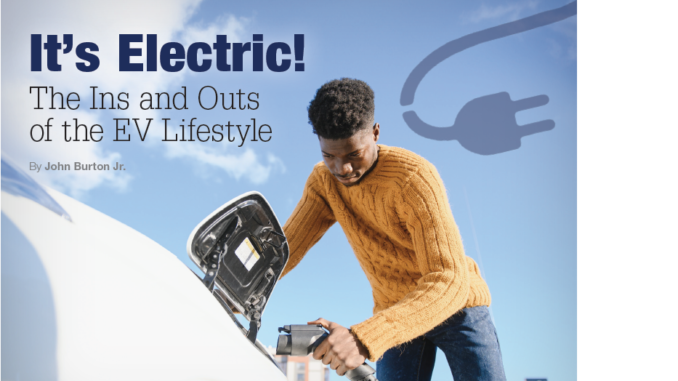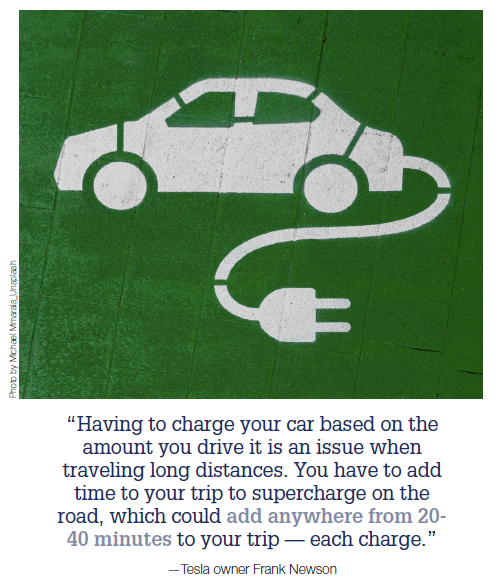
By John Burton Jr.
More people are choosing to charge it. Not their credit cards but their cars — their electric cars. Recent studies suggest more Americans are ready to shift gears to transition to Electric Vehicles (EVs) and contribute their part on the way to a clean energy economy. Whether it’s their sleek appearance, exhilarating drive or their eco-friendly effects on the environment, EVs are the rage, even in the African American community.
Consumer Reports surveyed over 8,000 Americans across all racial demographics and interest in purchasing electric vehicles overall was high. Of the Black people surveyed, 38 percent responded saying they would “definitely” or “seriously consider” purchasing or leasing an EV as their next vehicle. As awareness about EVs grows, more people are learning about the benefits and features of EVs. “I love mine,” said Donna Dunlap, a nonprofit executive and Tesla owner. “It looks and drives so well but I also wanted to do my part to protect the environment,” she added.
Many other African Americans, like Dunlap, have growing concerns about climate change and air pollution which has led them to consider EVs as a more sustainable and eco-friendlier alternative to traditional gasoline-powered cars. Aside from being eco-friendly, there are multiple benefits to EV ownership.
There are various government incentives, and rebates are available to encourage EV adoption. For example, the U.S. government offers a tax credit of up to $7,500 on the purchase of a new EV. These incentives can make EVs more affordable and appealing. An additional plus in owning an EV is the lowered need for regular maintenance. Since there is no traditional engine, oil changes, and many of the other mechanical components associated with an engine such as an exhaust system are no longer an issue, making maintenance extremely low.
“I really only have to worry about the tires, brakes and windshield wipers,” said Rodney Robinson, another Tesla owner. EVs also offer a substantial performance benefit over their gas-powered counterparts. Many EVs have an immediate torque and acceleration which enthusiasts say make for not only a quicker but more exhilarating ride. “With the instant torque from the engine, you can just go,” Robinson said.
While the adoption of EVs is increasing among African Americans, there are still some barriers that need to be considered — economic factors, charge length and access to charging infrastructure are the three greatest. While Tesla remains the leader in the EV space, other automakers have been expanding their electric vehicle offerings, with a wider range of models available in different price ranges. This will make it easier for people from diverse backgrounds to find an EV that suits their needs and budget.
Electric vehicles rely completely on batteries and electric motors for thrust, and the average charge lasts about 280 miles. When the charge runs short, connecting to a charging station or a home charger is required for about 30 minutes to get back on the road. Most homeowners in the U.S. will spend around $1,150 to $2,750 to purchase and install a home charging station, according to a March 2023 “Motortrend” article.
In September 2023, Charlotte had 585 public charging station ports, according to ChargeHub.com, and and318 or 54 percent of those ports offer free charges. Not all charge stations are free, and pricing varies. With more people buying EVs charging stations are becoming more plentiful. “There were only two in my building, but they have increased it to 10 now,” Newsom said.
Still, many of those stations are not located near African-American communities, so equity is not the same. Without access to charging stations, communities of color may be left behind in this EV explosion.
“I’m fortunate — there is a [high-voltage direct current] supercharger that is less than 5 miles from my home. I primarily charge my car at home since I have a home charger in my garage,” Robinson said. Nonetheless, experts say efforts to address these barriers and promote greater EV equity will be resolved over time as more people adopt the technology.
Before hopping on the EV bandwagon, experts and EV drivers agree — it’s best to do your research before buying an EV because that lifestyle is not for everyone. “Explore it. Go drive one, and do your math by assessing your driving habits,” Dunlap said. “I love mine. I will probably never go back to driving a gas vehicle again.”


